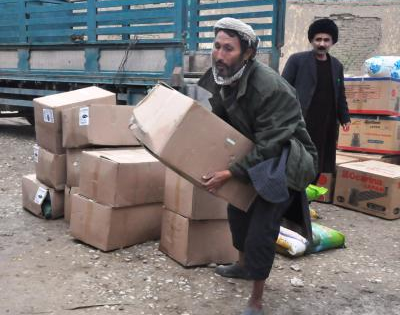UN OCHA warns funding shortage could disrupt humanitarian operations in Afghanistan
By IANS | Updated: November 16, 2025 20:40 IST2025-11-16T20:38:08+5:302025-11-16T20:40:16+5:30
Kabul, Nov 16 The United Nations Office for the Coordination of Humanitarian Affairs (OCHA) warned on Sunday that ...

UN OCHA warns funding shortage could disrupt humanitarian operations in Afghanistan
Kabul, Nov 16 The United Nations Office for the Coordination of Humanitarian Affairs (OCHA) warned on Sunday that funding shortage could halt humanitarian work in Afghanistan between October-December, local media reported.
OCHA said the potential disruption would impact life-saving assistance, including food supplies, clean water, education support and basic health services relied upon by millions of Afghan residents, Afghanistan's leading news agency Khaama Press reported.
The agency emphasised that immediate funding is important for keeping humanitarian work operational, noting that even short gaps would have “serious humanitarian consequences” as the winter is approaching.
UN agencies and international relief groups have repeatedly warned that Afghanistan's aid lifeline is facing extreme strain due to declining donations from international community and increasing needs of the people on ground.
Humanitarian analysts have warned that crisis could deepen further if international community does not make financial commitments, leaving vulnerable families without essential support at a time of rising food insecurity.
International organisations have urged donors to provide funds as Afghanistan's aid response is important to stop a larger humanitarian emergency in the coming months.
Meanwhile, the United Nations warned that 90 per cent of families in Afghanistan face severe food shortages.
The United Nations Development Programme (UNDP) said nine out of 10 Afghanistan families have been forced to reduce food consumption or sell assets to survive, a situation exacerbated by Afghan refugees returning from Iran and Pakistan, Khaama Press reported.
UNDP Regional Director for Asia and the Pacific, Kanni Wignaraja, warned that restrictions on women working in humanitarian and reconstruction projects have reduced access to essential services.
The report released on November 13 is based on a survey conducted of nearly 49,000 Afghan families, which includes more than 1,500 refugee families.
The return of nearly 2.3 million is further putting severe strain on recovery efforts in Afghanistan.
Disclaimer: This post has been auto-published from an agency feed without any modifications to the text and has not been reviewed by an editor
Open in app